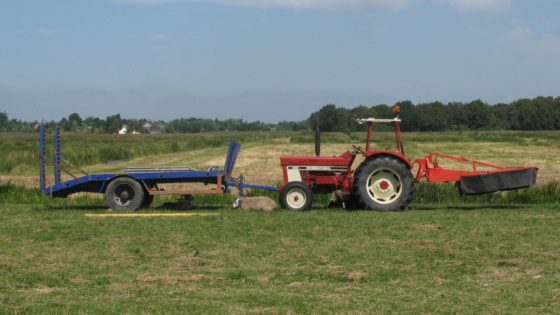Farming lobby steps up pressure on cabinet to drop compulsory buyouts


Agriculture organisation LTO Nederland has stepped up the pressure on the Dutch government to soften its nitrogen reduction plans, warning it will block a deal to reform the industry unless drastic changes are made.
Buoyed by the success of farmers’ party BBB in the provincial elections, LTO chairman Sjaak van der Tak said the cabinet needed to acknowledge the ‘electoral outcry’ from rural areas.
The LTO’s demands echo the key campaign points of the BBB: scrapping the accelerated deadline of 2030 for cutting nitrogen compound emissions, raising the ‘critical deposition value’ used to measure nitrogen deposits, and a guarantee that there will be no compulsory buyouts of farmers.
Van der Tak told the Telegraaf the latter was a ‘fundamental condition’ for any deal to reform the industry. ‘That means no compulsory buyouts or expropriation of property, and it also means no mechanisms imposed from above such as “landscape areas” [farmland where nature is prioritised over food production].’
The LTO is also pressing the government to revert to the target date of 2035 for nitrogen reduction ‘as set down in current law’ and to make all financial support streams available at the same time, so affected farmers have the widest range of options. ‘That will mean giving a substantial boost to the available budget,’ Van der Tak said.
‘No alternative’
The Dutch government is bound by a ruling from the Council of State to reduce nitrogen pollution levels in designated conservation areas known as Natura-2000 zones, as defined in an agreement between EU countries dating from 1992.
Nitrogen minister Christianne van der Wal has said there is ‘no alternative’ to requiring around 11,000 farmers to give up their businesses, as agriculture is responsible for 40% of nitrogen deposits in Natura-2000 areas.
The nitrogen ruling has implications beyond agriculture. Last week infrastructure minister Mark Harbers said no new roads or railways could be built until the issue was resolved, after judges ruled in November that an exemption from permit regulations for a port development in Rotterdam was illegal.
Millions of euros worth of projects have been put on hold and the money will be spent on maintenance instead, Harbers said. The construction industry generates around 11% of nitrogen compound emissions.
The LTO and the BBB both want the calculation method for nitrogen deposits to be scrapped and the legal limit, known as the critical deposition value, to be raised tenfold. They claim this would allow industrial activity to resume without harming the environment.
Cabinet divided
Prime minister Mark Rutte has said the provincial elections will inevitably ‘have an impact on policy’, but his cabinet is divided on how to respond.
Chrstian Democrat (CDA) leader Wopke Hoekstra, whose party’s vote was down by almost half as rural voters switched in their droves to the BBB, has said the government needs to change course on the ‘big issues’.
But climate change minister Rob Jetten, whose D66 party is committed to pressing ahead with the nitrogen reduction plan, said the government should wait for the provincial governments, which are responsible for regional planning, to take shape.
‘I think we should let the election results sink in,’ Jetten said. ‘It’s too early to talk about a change of direction.’
Thank you for donating to DutchNews.nl.
We could not provide the Dutch News service, and keep it free of charge, without the generous support of our readers. Your donations allow us to report on issues you tell us matter, and provide you with a summary of the most important Dutch news each day.
Make a donation